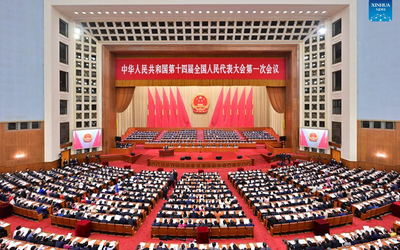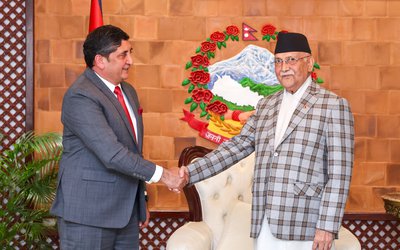
In order to support internal economic activities while maintaining macroeconomic stability, Nepal Rastra Bank (NRB) has made the monetary policy somewhat flexible.
Making the third quarter review of its monetary policy for the current fiscal year 2022/23 on Friday, the NRB said that the monetary policy direction has been made somewhat flexible based on the current situation and potential scenario of inflation and foreign exchange reserves.
Presenting the review of the policy, Executive Director of the NRB, Dr. Prakash Kumar Shrestha, said that while many countries have adopted tight monetary policies and some are holding the stable policy, Nepal has decided to go against the tide to make it flexible.
The NRB has reduced the bank rate by 1 percentage point to 7.5 per cent.
“Keeping the rate unchanged at 7 per cent, the existing bank rate has been reduced by 1 percentage point to 7.5 per cent, other rates under the interest rate corridor have been kept unchanged,” said the NRB.
The NRB has arranged to make the daily liquidity facility available at the bank rate of 8.5 per cent at the policy rate of 7 per cent from the half-yearly review.
As a result, the interbank interest rate has decreased by 1.5 percentage points. The provision of providing daily liquidity facilities at the policy rate has been continued, said the NRB.
The monetary policy direction has been made cautiously flexible to maintain macroeconomic stability based on the current situation and possible scenario of inflation and foreign exchange reserves and help to make internal economic activities viable.
Facilities for borrowers
In view of the sluggishness seen in the real estate sector of the economy, based on the need and justification, banks and financial institutions have arranged to analyse the borrower's cash flow and restructure/rescheduled loans related to hotels and restaurants, animal husbandry, construction sector and other sectors up to Rs 50 million by mid-July 2023.
Similarly, through the third-quarter review of the monetary policy, the NRB has made arrangements that the borrowers, who have paid regular interest on short-term and current capital loans, can extend the deadline for up to 3 months by mid-July 2023 without paying any kind of fees based on need and justification.
The central bank has made arrangements for borrowers who have taken loans from microfinance institutions to be able to restructure/reschedule their loans by mid-July 2023 based on their needs and justification.
The NRB expects that the implementation of the new provision adopted in monetary policy will strengthen internal and external stability and facilitate economic activity.
Due to the improvement in the external sector, the liquidity position in the financial system has eased, while the non-performing loan ratio in banks and financial institutions has slightly increased.
Inflation will be slightly above target Inflation is still slightly above target. Average inflation in the first nine months is 7.91 per cent. Consumer prices are under pressure due to increase in prices of food, dairy products, household consumables, imported goods and fuel along with devaluation of Nepali rupee.
The average inflation of the current fiscal year will be slightly above the target, said the NRB.
However, in view of the external and internal economic scenario and the decreasing price growth rate of imported goods, the pressure on the prices is decreasing gradually. According to Dr. Shrestha, the price could go down due to the decrease in demand of imported goods and petroleum products as well as the possible adjustment of transportation fare.
It is seen that the economic growth rate will be low in the current fiscal year.
The National Statistics Office has estimated that economic growth in the financial year 2022/23 will be 2.16 per cent in basic prices and 1.86 per cent in producer prices.
As liquidity is becoming easier, interest rates are decreasing and capital expenditure tends to increase in the fourth quarter, the economic activity in the private sector seems to be gradually easing.
Through the budget of the fiscal year 2022/23, the government has set a target to achieve an economic growth rate of 8 per cent and maintain inflation within 7 per cent.
Refinancing facility
Governor of the NRB, Maha Prasad Adhikari, said that to facilitate the businesses greatly affected by the current economic slowdown – manufacturing, construction, and wholesale and retail trade – refinancing has been announced. The central bank currently has a capacity of mobilising Rs. 57 billion in refinancing.
"The fund of refinancing would be used up by the next year. It will be provided to the sectors that witnessed the negative growth in the current fiscal year," said Adhikari.
According to him, the Standing Liquidity Facility (SLF) is need-based and the central bank would provide repo when the banks need it. Meanwhile, Governor Adhikari said that the margin lending (loan against the securities) would be provided by the brokers and it’s not the job of the banks and financial institutions.
Based on the reporting in The Rising Nepal
- China to open annual National People's Congress on March 5
- Dec 26, 2024
- 38 Dead in Wednesday plane crash in Kazakhstan
- Dec 26, 2024
- Bangladesh Requests India To Extradite Ousted PM Hasina
- Dec 25, 2024
- Trump's Tariffs Could Push Down Global GDP By 0.3 Percent
- Dec 25, 2024
- Turkey's foreign minister visits Syria, seeks ties with interim government
- Dec 23, 2024
















